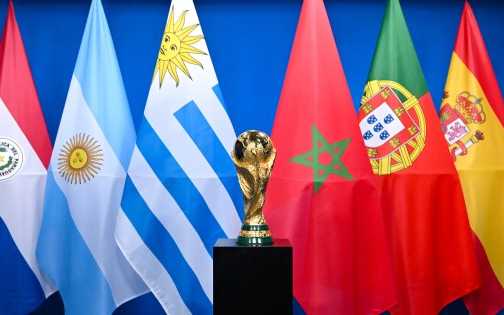FIFA, sensationally, has jumped the gun on itself and decided how to divide up the 2030 Centenary World Cup while simultaneously opening the door for Saudi Arabia to stage a winter World Cup in 2034.
TO BE RATIFIED
The decisions were taken by FIFA Council in an online video conference and will need to be ratified in due course by congress. But that will be a mere exercise in rubber stamping.
Football’s world governing body had been due to stage a congress vote on the 2030 hosting later next year. Only two formal bids were on the table. One was from a South American quartet of Uruguay, Argentina, Paraguay and Chile with the other linking Spain, Portugal, North African neighbour Morocco and Ukraine.
In the event both Chile and Ukraine have fallen by the wayside, Ukraine for the obvious reason that no official international matches are permitted there while the country is engaged in hostilities after last year’s Russian invasion. South America’s Chilean element has vanished without a trace.
DIPLOMATIC COUP
The decision is a diplomatic coup for FIFA president Gianni Infantino, comparable to the joint award of the 2002 finals to bitterly antagonistic Japan and South Korea by FIFA under the presidency of Joao Havelange.
FIFA’s projection for 2030 is that Spain, Portugal and Morocco will be the official World Cup but with at least three opening matches being staged in Uruguay, Argentina and Paraguay in a manoeuvre which effectively ‘buys off’ South American confederation CONMEBOL. This should allow a celebratory match to be staged in Uruguay’s Estadio Centenario even though it is nowhere near the infrastructural standard now demanded of ‘normal’ World Cup venues.
UNITING THREE CONTINENTS
The decision was announced in a lengthy FIFA statement:
In 2030, the FIFA World Cup will unite three continents and six countries, inviting the entire world to join in the celebration of the beautiful game, the Centenary and the FIFA World Cup itself.
The FIFA Council unanimously agreed that the sole candidacy will be the combined bid of Morocco, Portugal, and Spain, which will host the event in 2030 and qualify automatically from the existing slot allocation subject to the completion of a successful bidding process conducted by FIFA and a decision by the FIFA Congress in 2024.
Additionally, having taken into account the historical context of the first-ever FIFA World Cup, the FIFA Council further unanimously agreed to host a unique centenary celebration ceremony in Uruguay’s capital, Montevideo, where the first ever FIFA World Cup took place in 1930, as well as three World Cup matches in Uruguay, Argentina and Paraguay respectively.
A CELEBRATION
Infantino said: “In a divided world, FIFA and football are uniting. The FIFA Council, representing the entire world of football, unanimously agreed to celebrate the centenary of the FIFA World Cup, whose first edition was played in Uruguay in 1930, in the most appropriate way.
“As a result, a celebration will take place in South America and three South American countries – Uruguay, Argentina and Paraguay – will organise one match each of the FIFA World Cup 2030. The first of these three matches will of course be played at the stadium where it all began, in Montevideo’s mythical Estádio Centenário, precisely to celebrate the centenary edition of the FIFA World Cup.”
Infantino added: “The FIFA Council also agreed unanimously that the only bid to host the FIFA World Cup 2030 will be the joint bid of Morocco, Portugal and Spain. Two continents – Africa and Europe – united not only in a celebration of football but also in providing unique social and cultural cohesion. What a great message of peace, tolerance and inclusion.
“In 2030, we will have a unique global footprint, three continents – Africa, Europe and South America – six countries – Argentina, Morocco, Paraguay, Portugal, Spain and Uruguay – welcoming and uniting the world while celebrating together the beautiful game, the centenary and the FIFA World Cup.”
Bidding process for the FIFA World Cup 2034 launched
FIFA Council also decided that, in line with the rotation system, FAs from Asia and Oceania would be invited to bid for 2034. Australia, after the success of the recent Women’s World Cup, may throw a hat into the ring. However it is widely expected that Infantino’s long-term pro-Saudi strategy will be rewarded whatever the Australians may propose and whatever the angst of the human rights lobby.
The 2026 finals will be hosted in three countries – Canada, Mexico and United States – for the first time with an expanded field of 48 teams.
OTHER DECISIONS
U-17 national teams from Russia suspension lifted
Following the decision of the UEFA Executive Committee on 26 September 2023 to once again allow the participation of Russian representative youth teams at U-17 girls and boys level, the FIFA Council approved an extension of this decision to the FIFA U-17 World Cup and FIFA U-17 Women’s World Cup for which UEFA’s competitions serve as a qualification pathway, thus lifting the suspension on teams from Russia taking part in these tournaments.
This is conditional on these teams playing under the name of the “Football Union of Russia” rather than “Russia”, in the absence of their national flag, their national anthem, their national-team kit and equipment, and instead playing in neutral colours.
The FIFA Council reiterated its condemnation of Russia’s illegal war in Ukraine and confirmed that the remaining terms of the decision made on 28 February 2022 remain in force until the end of the conflict.
Launch of FIFA Futsal Women’s World Cup
The FIFA Council confirmed that the inaugural edition of the FIFA Futsal Women’s World Cup will take place in 2025 as a stand-alone tournament with 16 participating teams.
The respective slot allocation will be as follows: AFC: 3; CAF: 2; Concacaf: 2; CONMEBOL: 3; OFC: 1; UEFA: 4; host country: 1. Details on the tournament dates and the host country will follow in due course.
Updates on FIFA competitions
It was also confirmed that the FIFA U-20 Women’s World Cup Colombia 2024™ will be enlarged from 16 to 24 teams and take place from 31 August to 22 September 2024. The approved slot allocation will be as follows: AFC: 4; CAF: 4; Concacaf: 4; CONMEBOL: 4; OFC: 2; UEFA: 5; host country (Colombia): 1.
The FIFA Council also confirmed that the FIFA U-17 Women’s World Cup Dominican Republic 2024 will take place from 16 October to 3 November 2024 and the FIFA Beach Soccer World Cup Seychelles 2025™ from 1 to 11 May 2025.
New appointment
The FIFA Council also approved the appointment of FIFA Deputy Secretary General – Football, Mattias Grafström, as FIFA Secretary General ad interim with immediate effect.
Credit: AIPS Media


